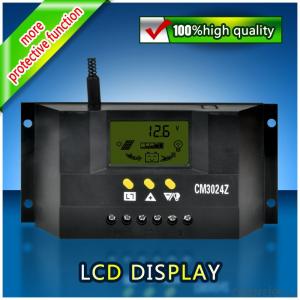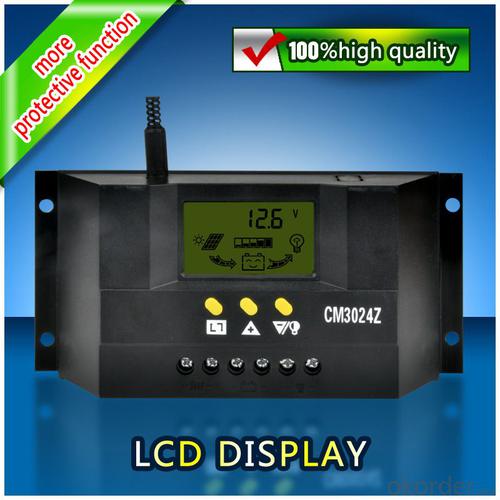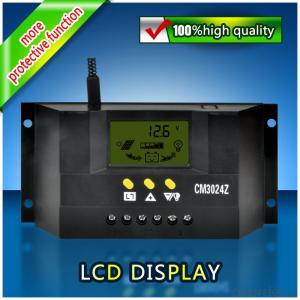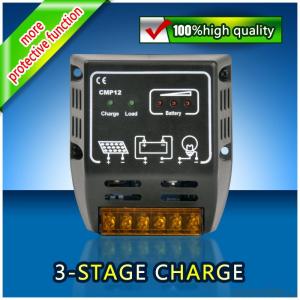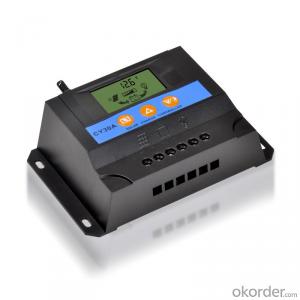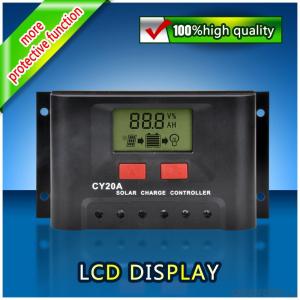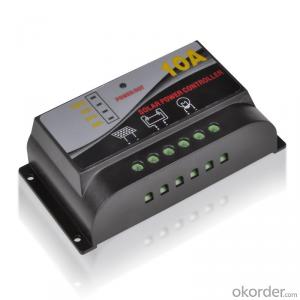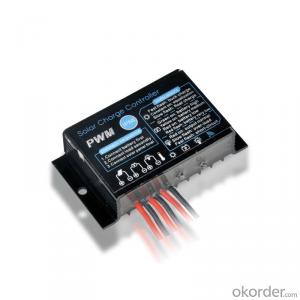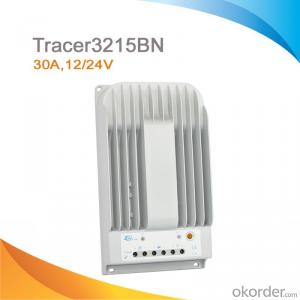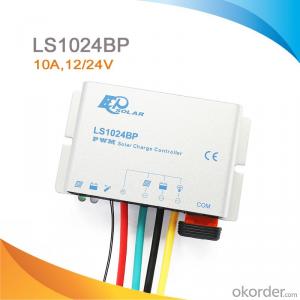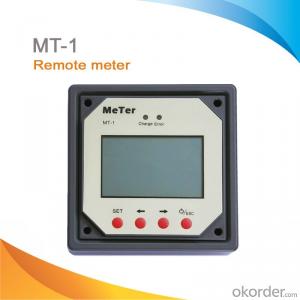Solar Controllers from Malaysia Supplier - Solar LCD Controller CM5048Z with Best Price
- Loading Port:
- China main port
- Payment Terms:
- TT or LC
- Min Order Qty:
- 1 unit
- Supply Capability:
- 10000 unit/month
OKorder Service Pledge
Quality Product, Order Online Tracking, Timely Delivery
OKorder Financial Service
Credit Rating, Credit Services, Credit Purchasing
You Might Also Like
Solar LCD Controller CM5048Z
Selection of high-quality materials properties be consistent from beginning to end
High Quality, High Performance.
For life is a convenient
A little more secure
The innovation design idea of the perfect show
The first set of people-oriented
The high-end configuration components
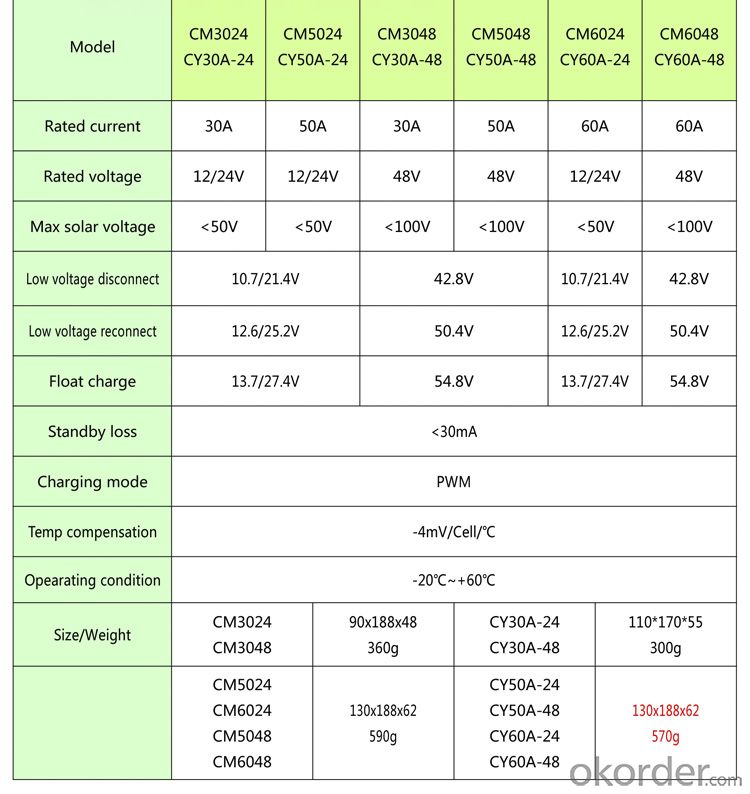
- Q: What is the load current rating of a solar controller?
- The load current rating of a solar controller refers to the maximum amount of current it can safely handle when supplying power to connected loads, such as lights or appliances. The specific rating can vary depending on the model and specifications of the solar controller.
- Q: Can a solar controller be used with solar panel backpacks?
- Yes, a solar controller can be used with solar panel backpacks. A solar controller helps regulate the voltage and current from the solar panel to the battery, ensuring optimal charging. It can be connected between the solar panel and the battery in a solar panel backpack setup to effectively manage the charging process and protect the battery from overcharging or damage.
- Q: What is the typical efficiency rating of a solar controller?
- The typical efficiency rating of a solar controller can vary depending on the specific model and brand. However, most modern solar controllers have an efficiency rating of around 95% to 98%. This means that they are able to convert 95% to 98% of the solar energy they receive into usable power for charging batteries or powering devices. The remaining percentage is usually lost as heat during the conversion process. It's important to note that the efficiency of a solar controller can be affected by factors such as temperature, system voltage, and the quality of components used.
- Q: How does a solar controller handle lightning protection?
- A solar controller typically handles lightning protection by incorporating surge protection devices and grounding techniques to divert the high voltage and current caused by lightning strikes away from the solar system. This helps prevent any damage to the solar panels, batteries, and other components connected to the controller.
- Q: What is the purpose of the battery state of health monitoring feature on a solar controller?
- The purpose of the battery state of health monitoring feature on a solar controller is to ensure optimal performance and longevity of the battery. It allows the controller to accurately measure and track the health of the battery over time, providing valuable information on its overall condition and capacity. By monitoring the battery state of health, the solar controller can take appropriate actions to maintain and prolong the battery's lifespan, such as adjusting charging and discharging parameters, preventing overcharging or deep discharge, and alerting the user if any issues arise. This feature helps users to maximize the efficiency and reliability of their solar system, as well as avoid potential battery failures or degradation.
- Q: Can a solar controller be used in a solar-powered refrigeration system?
- Yes, a solar controller can be used in a solar-powered refrigeration system. A solar controller is responsible for regulating the flow of electricity from the solar panels to the refrigeration system, ensuring optimal performance and preventing damage to the system. By controlling the charging and discharging of the batteries, a solar controller helps maintain a stable power supply for the refrigeration system, making it an essential component in a solar-powered refrigeration setup.
- Q: How does a solar controller prevent short circuits?
- A solar controller prevents short circuits by continuously monitoring the flow of electricity from the solar panels to the battery. It incorporates various protective mechanisms such as fuses, circuit breakers, and built-in voltage regulators to ensure that excessive current or voltage spikes are detected and prevented from causing damage. Additionally, it incorporates proper insulation and wiring to minimize the risk of short circuits.
- Q: Can a solar controller be used with solar-powered indoor transportation hubs?
- Yes, a solar controller can be used with solar-powered indoor transportation hubs. A solar controller regulates and optimizes the electrical energy produced by solar panels, ensuring efficient charging and proper utilization of the energy in the transportation hub. This helps maintain a reliable power supply and manage the energy demands of various systems within the facility.
- Q: Does a solar controller have a built-in timer function?
- Yes, a solar controller typically has a built-in timer function. This feature allows users to set specific time intervals or schedules for when the solar system should be activated or deactivated. The timer function is especially useful in applications where energy consumption needs to be regulated or when the solar system needs to operate during specific hours of the day. By utilizing the built-in timer function, users can maximize the efficiency and effectiveness of their solar power system.
- Q: What are the main functions of a solar controller?
- The primary functions of a solar controller, which can also be referred to as a solar charge controller or regulator, involve the regulation of the solar panel system's charging process and the safeguarding of the batteries against overcharging or discharging. 1. Charging Regulation: The solar controller guarantees that the batteries receive the ideal amount of energy from the solar panels. It continuously monitors the solar panels' voltage and current and makes necessary adjustments to the charging parameters, thereby maximizing the efficiency of the charging process. 2. Overcharge Protection: Preventing the batteries from being overcharged is a critical role fulfilled by the solar controller. Upon reaching full charge, the controller redirects the surplus energy from the solar panels to a dump load or halts the charging process altogether, effectively shielding the batteries from potential damage caused by overcharging. 3. Battery Discharge Protection: The solar controller also prevents the batteries from discharging beyond a specific threshold. By monitoring the battery voltage, it automatically disconnects the load from the batteries if the voltage drops below a predefined level. This precautionary measure helps extend the battery lifespan by preventing excessive discharge. 4. Load Control: Some solar controllers offer the added capability of load control. They regulate the power output to connected loads such as lights or appliances, ensuring they receive an appropriate amount of power without excessively draining the batteries. 5. Monitoring and Display: Many solar controllers come equipped with monitoring features that provide valuable information such as battery voltage, charging current, solar panel output, and system status. This enables users to easily monitor their solar system's performance and make any necessary adjustments. Overall, a solar controller plays a vital role in ensuring the efficient and safe operation of a solar panel system. It accomplishes this by regulating the charging process, protecting the batteries, and providing monitoring and control capabilities.
Send your message to us
Solar Controllers from Malaysia Supplier - Solar LCD Controller CM5048Z with Best Price
- Loading Port:
- China main port
- Payment Terms:
- TT or LC
- Min Order Qty:
- 1 unit
- Supply Capability:
- 10000 unit/month
OKorder Service Pledge
Quality Product, Order Online Tracking, Timely Delivery
OKorder Financial Service
Credit Rating, Credit Services, Credit Purchasing
Similar products
Hot products
Hot Searches
Related keywords
